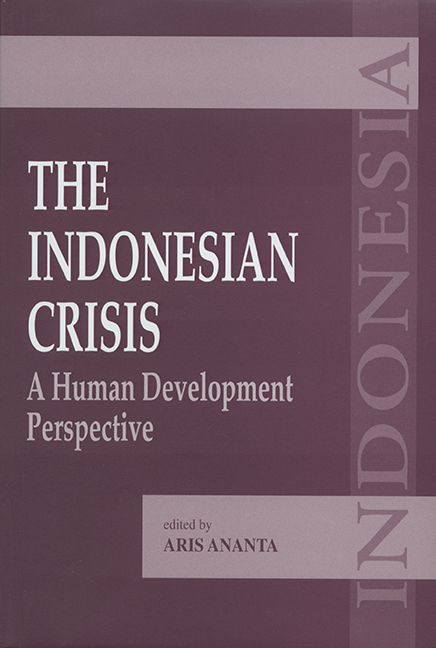Book contents
- Frontmatter
- Contents
- Acknowledgements
- List of Contributors
- Part I Introduction
- Part II Human Capital
- 5 Freedom from Fear: Social Disruption and System of Violence in Indonesia
- 6 Health Status of Indonesians During the Economic Crisis
- 7 The Indonesian Economic Crisis: Impacts on School Enrolment and Funding
- 8 Population Mobility and Social Conflict: The Aftermath of the Economic Crisis in Indonesia
- Part III Purchasing Power
- Part IV Emerging Issues
- Index
5 - Freedom from Fear: Social Disruption and System of Violence in Indonesia
from Part II - Human Capital
Published online by Cambridge University Press: 21 October 2015
- Frontmatter
- Contents
- Acknowledgements
- List of Contributors
- Part I Introduction
- Part II Human Capital
- 5 Freedom from Fear: Social Disruption and System of Violence in Indonesia
- 6 Health Status of Indonesians During the Economic Crisis
- 7 The Indonesian Economic Crisis: Impacts on School Enrolment and Funding
- 8 Population Mobility and Social Conflict: The Aftermath of the Economic Crisis in Indonesia
- Part III Purchasing Power
- Part IV Emerging Issues
- Index
Summary
Fear is an important problem in its own right. It makes life miserable for those who fear and prompts citizens to take actions that make their neighborhoods even more dangerous.
— Mark H. Moore and Robert TrojanowiczIt is not power that corrupts but fear. Fear of losing power corrupts those who wield it and fear of the scourge of power corrupts those who are subject to it.
— Aung San Suu KyiThis chapter attempts to elaborate “freedom from fear” as an essential social capital needed for Indonesia's economic recovery. First, it argues that fear is an effect, but at the same time a cause of violence. The prolonged and systemic social disorder and violence triggered by the existence of cultural values justify violence and social structures that create inequity in a society. Inequity causes jealousy and distrust, and these are the footsteps of violence. This chapter proposes that to release individuals from fear, violence should not be used, for violence always results in further violence. Rather, the government should focus on two basic factors that can break and resolve the systemic violence, namely, equality and trust.
Years of Violence
Two years before the new millenium, in 1998, the Indonesian people celebrated what was called the most democratic election in the last fiftythree years of Indonesian independence after the 1955 election. The election was the starting point of democratization and the establishment of a civil government. It was, however, not the turning point of prolonged violence and political turmoil. The violence has even escalated since then. When the winning party, the Struggle Indonesian Democratic Party (PDIP), failed to place Megawati Sukarnoputri as the new President in the People's Advisory Assembly plenary session, her fanatic supporters in Jakarta, Solo, Denpasar, and other places raged violently in the streets. Though the leadership of President Abdurrachman Wahid and Vice- President Megawati was widely acknowledged as legitimate, and the Pelangi (rainbow) Cabinet represented equal power-sharing among the major political parties, violence did not end.
In the first days of Wahid's administration, he visited many countries in East and Southeast Asia, the Middle East, the United States, and Western Europe to assure the world that Indonesia maintained democracy and security, and called on foreign investors to come and invest in Indonesia.
- Type
- Chapter
- Information
- The Indonesian CrisisA Human Development Perspective, pp. 105 - 158Publisher: ISEAS–Yusof Ishak InstitutePrint publication year: 2002



